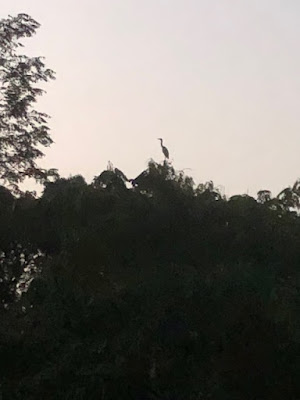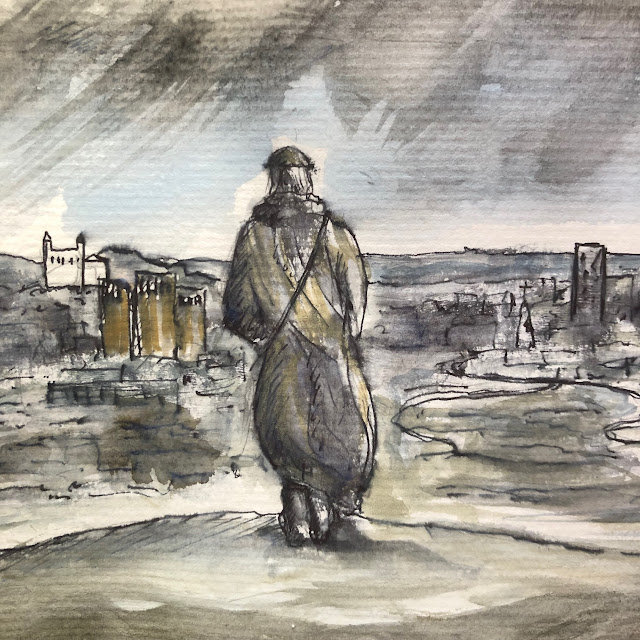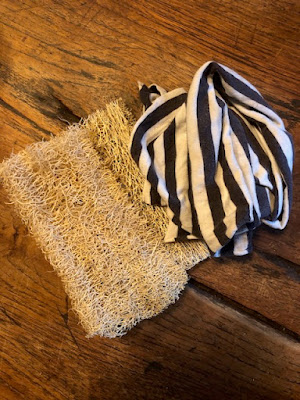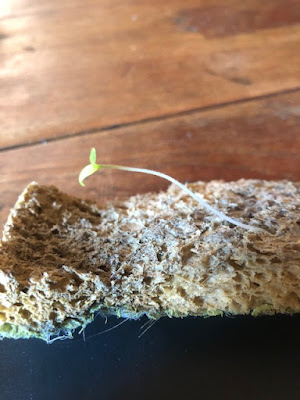Autumn apples and Messiaen.
© Kate A Hardy 2023
Patricia Verber had received the card via the almost defunct postal system on Fiveday. She'd propped it up against the tea flask on her kitchen shelf and had regarded it in turn suspiciously
in turn with curiosity throughout the hours of daylight. It had preoccupied her dreams too, and on awakening on Sixday she had finally slipped an index finger under the envelope flap and held her breath as the triangle of thick paper gave way with a tiny ripping sound.
It was a long time since she had fingered such luxurious paper - pale cream with slight ridges and a faint scent of vanilla. The card itself was pearl grey, lightly curved on each corner and inscribed with the words:
Felicitations. You are invited to visit the museum of Beforehand on this prescribed date and time.
The date was during the next Seveday on the one afternoon she was free from her work at Nourishment sector 3. She had worked there for what now seemed a blurring number of years, her limbs becoming stubborn, groaning at the various repetitive motions they were required to undertake. The Curist she had seen at the last routine inspection had regarded her without expression over his angular metal spectacles and made a few perfunctory notes on his metatab before waving a dismissing hand towards the door. She hadn't received a report then or later. Maybe everything had been as it should be. But the card was a little worrying. She could ask people at the factory about it, but she could already see the purposefully neutral shrugs, a certain caginess.
The museum of beforehand sounded harmless enough, dusty, perhaps.
The day arrived, dank and deep grey, the factories' smoke blending with the Northern Estuaries mist to create an almost unbreathable air.
Patricia wrapped her felty close about her and pulled the wool cap down lower. She stopped at the slope's crest to scan the remains of the city; the new smoked glass towers looming in the fog, the presidential headquarters bright and white as a healthy tooth atop the tallest hill.
The tram lines wound silver snake-like patterns in the tired brownish snow, the station a hump of a building. She turned her already cold feet in its direction and walked as quickly as it was possible on the semi-iced sidewalks.
Line seven would take her to an area she had never been to before. Angel, the woman who lived across the corridor had said there was nothing there except one huge building, but on further questioning had revealed that she wasn't sure - just something she had heard. The door had closed, her voice repeating the last phrase.
There were just two other passengers - a man so bundled in clothing he resembled the plasto-slag heaps that sprouted ever increasingly beyond the fading city's boundaries; the other a man of God, his chains of coins jangling and chinking as the tram swayed along its contorted lines.
The slag-heap man descended at Funland and waddled towards the once-pink entrance to whatever lay beyond. Patricia watched him thump the door in frustration as the tram pulled away. Perhaps Funland was no longer there. He would have to cross the lines and return to wherever he lived.
The man of God recited texts from his head, occasionally seizing the largest coin and pointing at it, inciting Patricia to join in with whatever narrative was playing out in his mind.
She turned away and saw with relief that her stop had been illuminated on the flickering panel above the carriage door. The doors grunted open, and she stepped out into a oddly clinical environment - no heaps of muddy snow, no factory grime, just sleek grey walls and a double door which slid noiselessly apart at her approach. On the other side rose a smooth slope with manicured grass on each side of a straight path. The cold reminded Patricia that she was still somewhere in the city, and that she hadn't somehow been transported to a different and oddly silent land. No wind appeared to blow in this area; the leafless trees planted in equidistant lines as still as bricks.
She took the path hesitantly but then walked with a certain pleasure as the flat, unpitted surface met with her shoes, allowing a speed she was not accustomed to.
At the top of the slope she stopped, taking in the view before her. What she supposed was the museum of beforehand was much larger even than Nourishment Sector 5. It sat squarely between cloud and a vast expanse of the manicured grass, as featureless and grey as anything could be. No windows or lettering graced its facade, nothing to announce that it was anything other than the biggest cube of concrete ever fabricated.
She walked as if in a dream, her arms and hands slightly twitching as if missing the perpetual movements they would have been normally undertaking. Her feet and legs rejoiced at the unnatural freedom; despite the cold she could imagine undoing the wool boots and casting them aside, to walk fast and barefoot.
She arrived at the monstrous cube and as if awakening from the dream noticed a faint door-shaped outline in the grey mass and a sign no bigger than the envelope in her pocket which read: The Museum of Beforehand. Ring the bell once and wait.
She did and didn't have to wait as the door or rather door space appeared to melt away leaving an oblong part-occupied by a white garmented woman who extended a hand in greeting.
"Patricia. Welcome."
Patricia couldn't remember the last time she shook hands with anyone. Possibly never . . . The hand was slight, warm and soft. The skin of someone who probably didn't twist levers and lift boxes all day.
"Why am I here?"
As the words emerged Patricia wondered if they were a little odd, but it was really the only question in her mind. The woman smiled calmly. She wore lipstick which was exactly the same colour as her flesh, just a hint of a shine illuminated by the stripes of blue-white lighting sunk into the ceiling.
"You have earned the right to a rest. Forty-seven years of service to our great society is certainly something."
"A rest? Am I to go somewhere else?"
"In your mind, yes."
"How long will it take? I have to be back at work in the morning."
The woman laid a gentle hand on her arm. "If you would follow me, please . . . there will be a refreshment before your session."
Patricia complied. This was certainly a hundred times more interesting than the poultry transformation line she would be back to on the morrow. She was shown into a small room where a beaker and plate sat on a table, and a white robe and slippers hung in the otherwise empty space. The drink appeared to be a pale tea of some sort and the plate held a little white cake with pale pink cream topping. Patricia drank and ate - her slice of gov-issue bread and oil was now hours. She felt a little light-headed. The white robe's hem appeared to undulate a little although there was no window or draft. She felt apprehensive at casting off her layers and donning the unusual garment, but it was what had been requested by the woman.
The robe felt downy and light. She would have liked to see what it looked like but there was no mirror.
A light knock at the door interrupted the utter silence of the room.
"Miss Verber, are you ready?"
Patricia stood obediently at the door. "I am."
The door slid aside and the woman with pale cream lips nodded at her. "Good. We'll start."
They walked without talking. Patricia felt the surge of questions arise and fall again as a certain tranquility seeped into her mind. After what seemed like at least a kilometer of white corridors the woman stopped at a door marked: Memory Hub. She held her index finger to a tab and the door opened revealling a white desk, two chairs and a wall filled with hundreds, possibly thousands of tiny drawers.
The woman pulled out the chair. "Please wait here. The apothecary will see you soon."
Patricia wanted to pull her back by her white sleeve, ask the questions that had reemerged, but she was gone, sleek shoes tapping on the tiles of the corridor. The door closed with a minuate click.
"Miss Verber?" Patricia turned to see that the other chair had been filled by - she assumed - the apothecary. "Thank you for meeting me today," he continued, his glasses reflecting the green blue of a screen that sat before him. "Do you know why you are here?"
Patricia recalled the woman's words of earlier. "To have . . . a rest?"
"That's correct. A well-earned rest." Lines of illegible script rolled in his glasses. His fingers tapped lightly and quickly. "I would like you think of the happiest moment in your life."
" . . . Happiest?" Patricia had been expecting a question about aches and pains, not happiness. "Well . . . I don't really know."
The apothecary tapped and glanced at a time piece on his wrist. "Just the first thing that occurs to you."
Subservient, Patricia realised he must have a queue of persons waiting. She searched in the void of her mind. Nothing much surfaced in the true happiness department. Most memories were things she'd rather keep submerged. She thought through the childhood section - mother - eternally anxious, fearful of father. Had there been a memorable time? That visit to the coast before it had become forbidden . . . no, it wasn't happy, rather melancholic at best. Then a faint glimmer of something caused her brow to uncrease, almost a smile to appear on her set face. The working holiday her father had undertaken - him a gardener on some vast estate southwards.
Patricia had gone with him; she couldn't remember why now. She'd been given the freedom of that land, allowed to roam whilst he worked. There was something in the corner of her mind - something that she had forgotten over these many grey years.
The man opposite her coughed a little: "I will have to ask you to furnish me with a response, or we can implant a memory for you - but it's never as satisfactory, you see."
"I see . . . yes. I think I know . . . shall I tell you about it?"
"That won't be necessary. I do however need to know what scent you associate with that recollection."
Patricia ran the memory through her mind: roses, the greenish-brown smell of a lake, manure from the huge-eyed, beige cattle . . . but it was the smell of apples she recalled above all: soft, slightly withered yellow apples that were stored in a large shed, a shed where an elderly man built little brass engines. She had been utterly transfixed by his work and he had the time or had taken the time to show how the machines worked. Happiness.
"Apples," she said, suddenly. "Stored apples."
The Apothecary removed his glasses and rubbed a hand over his eyes. "Hm, Apples." He stood up whispering to himself then moved to the wall of drawers. " . . . Apples, apples . . ." After some pulling in and out of drawers and muttering, he finally removed a drawer and brought it to the desk. Removing five small brown bottles he studied the labels. "You have a choice. Fresh apple - cut. Apple pie. Apple juice. Wizened apples. Fallen and semi-rotten apples."
Patricia thought back to the shed. The small yellowing apples stored on the shelves in newspaper would be termed as wizened, surely. "Could I smell one of them?"
"No - no . . . it has to be done at the right point. So, which is it to be?"
"Wizened, please."
"Wizened, it is then."
She thought she might have seen a small smile spark across his face but if she did, it just as quickly vanished.
"If you would follow me, please."
The Apothecary headed towards a different door, pausing briefly to pass a few words to an assistant. "Bay ten - then Mr Gruber in fourteen. Is the last case . . ." he glanced briefly at Patricia before lowering his voice, "finished?"
The assistant nodded. "Yes, Sir."
"Good. The inspectors are in at thirteen hours - make sure everything is in order."
Patricia followed the Apothecary's flapping white coat and neat brown shoes down another corridor, her mind questioning his words to the assistant. He stopped at a door marked Bay ten.
"After you, Miss Verber."
Patricia stepped into a small room containing a sterile-looking bed, over which hung a metal box. Various tubes and wires sprouted from it. Patricia began to feel a certain panic rise within her, a feeling that she must have done something wrong and was about to be punished.
She turned to face the Apothecary. "I'd quite like to go back to work . . . if that would be possible."
He summoned up what he must have felt was a comforting smile. "You are anxious about the monitor apparatus, perhaps. Really, nothing to worry about - we have to check that everything remains as it should while you rest." He laid a hand on her arm. "It's going to be wonderful."
Used to instruction, she obeyed, removing the slippers and lying down on the bed. The Apothecary approached her prostate form.
"I'll leave you in the capable and caring hands of Mallory. Goodbye, Miss Verber."
Mallory, a red-haired, bright-eyed young woman greeted Patricia.
"Hello, Dear. Ready for your rest? Lovely. Just let me have your arm . . . marvellous. Just a little prick, there. And the other arm . . . great. I'm just going to place these patches on your chest - it's to monitor your heart. I saw you've chosen apples. I love apples . . . shame we don't see them these days . . .dried stuff's not the same, eh?"
The girl nattered on as she attached more wires and tubes. Patricia nodded and smiled as best as she could, not wishing to seem rude although her mind was now shouting to her that this all seemed very peculiar and probably dangerous.
Mallory stopped attaching and wiring. "Done! Now, just the mask and in a few moments, you'll receive your chosen scent and will start your lovely rest. It was nice to meet you, Patricia."
"Will you stay here?" Patricia's voice sounded odd in her head, distant as if she called through the wind to someone. Mallory had left. The mask felt heavy and rubbery. A faint smell of dust and sweetness entered her nostrils, a tap-tapping sound of metal on metal became clearer and clearer. The white room was disappearing, the bed dissolving beneath her.
I don't know if I am allowed to be here. Daddy didn't say . . . but he was cross with me in the morning and I don't like him now. I like this place, it's all full of old things - not like our house, and it smells nice, all sort of fruity and dusty, and there is music playing. I hope the man sitting at a table won't mind me looking in here.
" . . . Hello, dear. You must be the daughter of our summer gardener - Patty, isn't it?"
I walk nearer to the table, but not too close because Mummy says we have to be careful with strangers.
"Some people call me that."
"Do you like the name - or do you prefer another?"
I think about this as I like the question and I don't really like my name. "I think I would rather have been called Susan."
He smiles and his wrinkles go all big on his cheeks. "Well, let's say you are Susan in here."
"What is this place?"
"It's my special barn where I can keep out of the way."
"From what?"
He sighs and I know that if I was a grown-up, he would tell me lots of things, instead he says: "I just like to be on my own sometimes, make my traction engines and listen to Messiaen."
"Who is Messiaen?"
"A French composer - he goes well with model making - for me anyway."
I move a little nearer and see the shine of warm-coloured metal. and the tools he is using. "What is a traction engine?"
"It's a very heavy steam powered tractor used to pull heavy loads. We used to have one on the estate here - now I like to make models of them."
"Why?"
He shrugs but in a friendly way - not like Daddy does when he doesn't care what I say. "Because they are beautiful - especially when they are models."
He beckons me to come closer and look, and I do because I'm not scared of him. He tells me that the little engine is made of brass and it's very, very nice. He says what all the different bits are - pistons, chimney, levers, wheels, and then he makes it work which is more exciting than anything. He asks me if I mind the smell, but I don't mind it. It's called methylated spirits.
When the engine stops, I ask the man what his name is.
"Malcom," he says, "but you can call me, Malc, if you like."
We watch the last little clouds of steam coming from the engine's chimney.
"Malc?"
"Yes, Susan."
"What is the fruity smell in here?"
He looks over to the back of the building. "It's my autumn apples - from last year. Would you like to try one?"
He stands up slowly and stretches and says: "Ow." He is quite old, I think. He walks with one leg straight and the other a bit bent. "Here, come and see my store area."
In the back of the barn there are lots of shelves with wooden boxes. He pulls one out and takes a layer of brown rustly paper off. the box has rows of little yellow apples with wrinkly skin, a bit like his face.
"Take one, Susan."
I do, and bite into it. It tastes like custard and jam that Grandma used to make me when she was alive.
"Is it nice?" he asks.
I nod.
"Good. My wife says she doesn't know why I bother collecting them . . . it's partly because of the scent. I like it when I work in here - Messiaen, methylated spirits and autumn apples."
In the corner just near the shelves I see that there is a sort of old sofa. I feel tired in a happy way. I would like to lie on the sofa and smell the apple scent. I ask him if that would be all right.
"Of course," he says. "If you don't mind listening to Messiaen?"
"I would like that."
"Marvellous. Then We could have some tea - I have a kettle and everything here."
I take off my shoes and lie down on the lumpy old sofa. The sun makes lines of sparkly dust from the window. Malc whistles a tune while he takes a vinyl record out from a pile next to him, drops the black disc into his hand and puts it on the player. The scent of apples is strong and sweet. I feel the taste of them in my mouth as the orchestra starts to play.
"Has she gone, Mallory?"
"Yes, Sir."
"Peacefully?"
"Very. she was singing something at the end."
"Wonderful. Write it all up, would you - after you've prepped for the next client . . . male, ex-boxer - from when there was sport. He might be a bit tougher - call for sedatives, if needed."
"Certainly . . . Sir? Is she to go to bovine nourishment or study?"
"Study. Although she had reached her time, she was mostly very fit - I think there could be harvesting potential there. Ask for the freezer team to take her."
"Will do. Would you like a coffee, sir?"



























